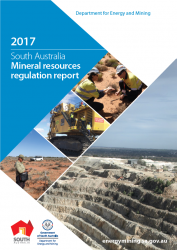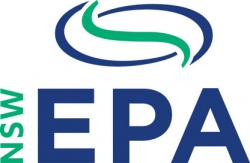
Search archive
2017 South Australian Mineral Resources Regulation Report
09/10/2018

The Mineral Resources Regulation Report 2017 was released by the South Australian Department for Energy and Mining this month. The report provides an annual account of the ongoing work administered by the Department to ensure the state’s mining laws are upheld.
Transparency, accountability and benchmarking are key features of the regulatory framework for the South Australian mineral resources sector.
This annual report demonstrates to the South Australian public an assurance that the mineral resources sector is accountable to regulators, landholders and the community. It also comprises key indicators on the performance of exploration and mining companies in meeting their compliance obligations to mitigate and manage genuine environmental risks associated with their operations.
The Department for Energy and Mining is committed to responsibly unlocking the value and opportunities of our mineral resources in an environmentally and socially sustainable manner.
Further information can be found on the department's website.
If you have any queries, comments and feedback on the annual report please contact Alex Blood, Executive Director, Mineral Resources , Department For Energy and Mining
Individual fined $45,000 for illegal waste activities
05/10/2018

A Mount Morgan land owner has been convicted and fined $45,000 on charges relating to the illegal storage and handling of regulated waste on his property.
John Kevin Campion pleaded guilty to the charges in the Rockhampton Magistrates Court on 12 March 2018.
Campion was charged with carrying out an environmentally relevant activity without an environmental authority; being a generator who failed to give prescribed information to the Department of Environment and Science; wilfully failing to comply with a clean-up notice; providing false or misleading information; and wilfully and unlawfully causing material environmental harm.
Campion variously contravened the Environmental Protection Act 1994 and the Environmental Protection Regulation 2008.
The Court heard that in December 2015 a warrant was executed on Campion at his Mount Morgan property where more than 50 200-litre drums containing regulated waste were observed.
Results of sampling concluded that the drums contained hydrocarbons, organic solvents and phenols, all of which are prescribed regulated wastes.
In June 2016, Campion told the department that all regulated waste had been removed from his property, however subsequent departmental investigations showed this to be false. Campion was then issued with a clean-up notice to remove all regulated waste from his property, which he failed to comply with.
The Court was told that in July 2016, information was received that a number of 200-litre drums had been dumped in a gully near Campion’s property.
The department then relied on staff observations, DNA analysis from a cigarette butt retrieved from the gully, and samples of the drums’ contents to show that Campion had illegally dumped the drums.
In addition to the fine, Campion was ordered to pay investigation costs of $8,138.04 and legal costs of $1,500.
NSW EPA steps up efforts to recover the proceeds of environmental crime from offenders
05/10/2018

The NSW Environment Protection Authority (EPA) has released a new robust and transparent framework to recover the proceeds of environmental crime from offenders, a first for environmental regulators in Australia.
The EPA can apply to the Court for a monetary benefit order (MBO) to be imposed on an offender as part of the sentencing package. MBOs aim to strip offenders of the illegal profits they made from committing an offence.
The EPA’s Chief Environmental Regulator, Mark Gifford, said offenders should not profit from committing an offence.
“Recovering monetary benefits as part of a sentencing package provides a deterrent for possible future offenders and an incentive for operators to take proper precautions,” Mr Gifford said.
Monetary benefits are the financial advantage that an offender gains from committing an offence. For example, additional funds may be available to the business that should have been used to comply with environmental legislation, including infrastructure improvements, or additional profits may have been made from illegal operations.
While the EPA has had this power since the introduction of the Protection of the Environment Operations Act 1997 (POEO Act), a robust and standardised approach to calculating and recovering monetary benefits in appropriate cases has been developed that can now be applied.
The new framework will help the EPA determine the monetary benefits offenders obtain through breaking environmental laws and to pursue the recovery of those benefits in appropriate cases, through the court process. A Protocol for calculating monetary benefits, supporting guidance and calculation tools have also been developed. The EPA intends to formally prescribe this Protocol, by Regulation.
The framework has been developed using work done by the US Environmental Protection Agency as a model, and in close collaboration with Victoria EPA.
“We wish to thank Victoria EPA for their ongoing commitment to developing monetary benefit approaches with the NSW EPA, and in particular I’d like to thank them for enabling us to use and publish the NEAT Model monetary benefits calculation tool” Mr Gifford said.
Mr Gifford hopes the framework will be adopted by other environmental regulators across Australia, which are at various stages of introducing the recovery of monetary benefits into aspects of their criminal prosecutions and civil penalty work. And there is scope for the framework to be adopted by local councils in NSW.
“Ultimately, we want to see MBOs being routinely considered by courts across Australia and New Zealand, so there is widespread deterrence, and offenders are being held to account.” Mr Gifford said.
More information can be found on the NSW EPA’s website.
The NSW EPA acknowledges and thanks AELERT and its members for their ongoing support and interest in the MBO project and will continue to be actively involved with this initiative through the AELERT Legal Practice Cluster.

